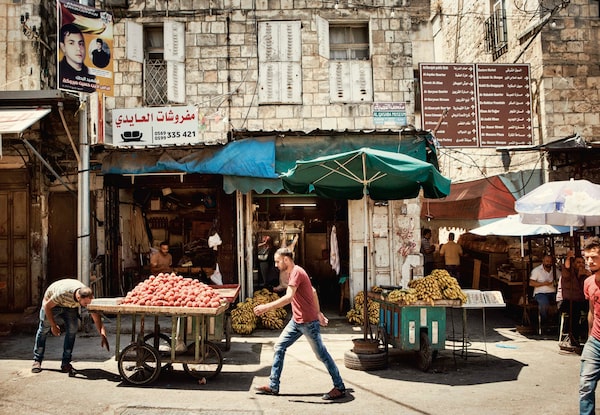Plan your weekend with our Good Taste newsletter, offering wine advice and reviews, recipes, restaurant news and more. Sign up today.

Supplied
Of all the places I thought a journey could begin, the shower on a Tuesday evening wasn’t one of them. A sharp and nutty aroma had made its way under the bathroom door. There I was, thinking about winter – and how this one especially would test the spirits – when out of nowhere, a savoury perfume of red onion and cumin, cooking in oil, hit me. As someone of South Asian heritage, I’ve been close to this fragrance countless times, but I was still taken aback.
The spicy scent punctured the steam around me and all I could do was close my eyes and inhale greedily. This much-needed momentary escape – by Tuesday, it had already been a long week – was the kind of departure I’d been hoping for when I purchased Sami Tamimi and Tara Wigley’s cookbook, Falastin.
My husband was finishing off the topping for our dinner of chicken musakhan. A popular national dish from Palestine, it features chicken roasted with sumac, allspice and cinnamon, topped with onions softened in lashings of olive oil with pine nuts and parsley. It’s eaten with torn pieces of grilled pita.

Chicken musakhan.Jenny Zarins/Penguin Random House
When I bought the book, I wasn’t really looking for stuff to cook – I have plenty of recipe books that haven’t been opened in years. I was looking for adventure and a way to discover a country I’ve always wanted to visit through the magic of food. But Falastin is not just a cookbook. It’s more like an instructional guidebook that takes you on a trip as soon as you open it. Perusing its pages for the first time is similar to the sensation I get when stepping out of the airport at a new destination. Of course, there are mouth-watering recipes, but alongside them you’ll find stories, colourful photography (not just limited to food) and a window into Palestinian culture and history.

Falastin is filled with colourful photography.Jenny Zarins/Penguin Random House
I didn’t realize Falastin would also give me a new lens through which to experience my hometown of Toronto. It revived research skills that are purely reserved for my travels, as well as some curiosity and wonder. Tracking down Aleppo chili flakes, freshly baked pita and liquid-gold olive oil led to some interesting encounters in the city. I happily spent a small fortune at House of Spice in Kensington Market; there’s something novel about being a Pakistani person who gets excited about spices.
Little did I know that Falastin would also become my talisman this winter. Cracking yolks into a yoghurty bechamel sauce for a decadent pasta bake was a satisfying way to flip off the diet culture that permeates the start of the year. The impromptu cooking of dishes like samak mashew bil cozbara w al limon – roasted cod with a cilantro crust – brings a spark to the week that’s usually non-existent this time of year. And a shakshuka brinner (breakfast for dinner) gives me something more nourishing to relish after work than the latest Netflix binge.

Roasted cod with a cilantro crust.Jenny Zarins/Penguin Random House
Food is a means of exploring. And at a time when we can’t even eat in restaurants, let alone hop on a flight, new recipes have been a way to get off-the-beaten-path. While I may have bought this cookbook to discover a new country, in the end, the adventure became about revisiting my routine at home.
As Sunday rolled around, I found myself in the kitchen doing meal prep, but instead of using run-of-the-mill ingredients I normally track with MyFitnessPal, Falastin inspired me to cook for the work week in ways I hadn’t before. These meals weren’t destined for a Tupperware to be forgotten at the back of the fridge. They would be souvenirs of my new-found zest. I made soft-boiled eggs to have as part of Tamimi’s father’s go-to breakfast, along with za’atar and lemon. For lunch, green lentils with tahini and crispy onions and a batch of whipped feta to enjoy alongside roasted squash, zucchini, and pistachios. Just a little something to look forward to on Tuesday.